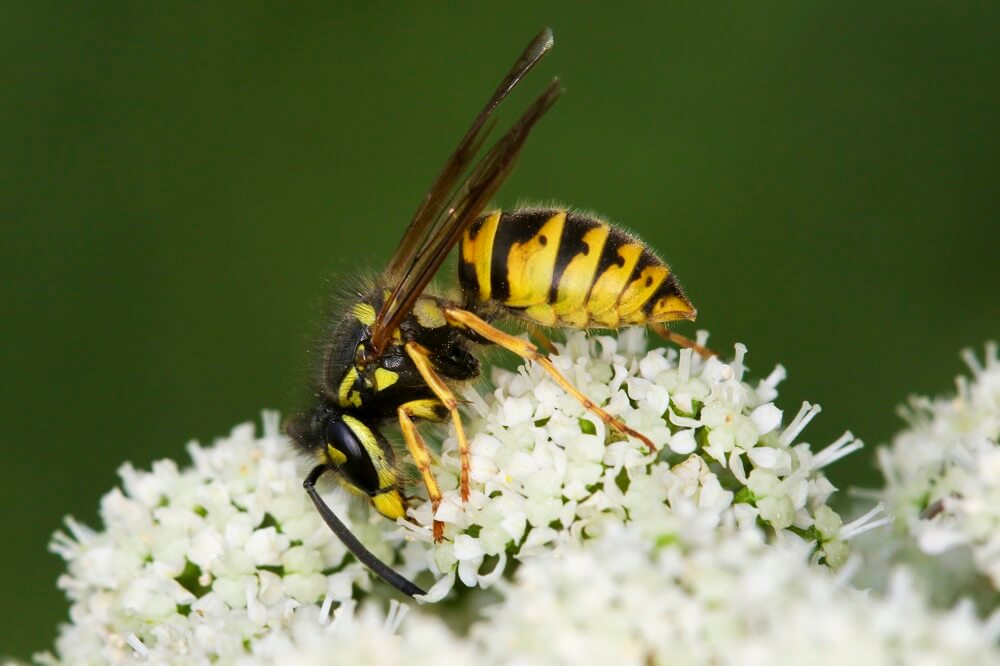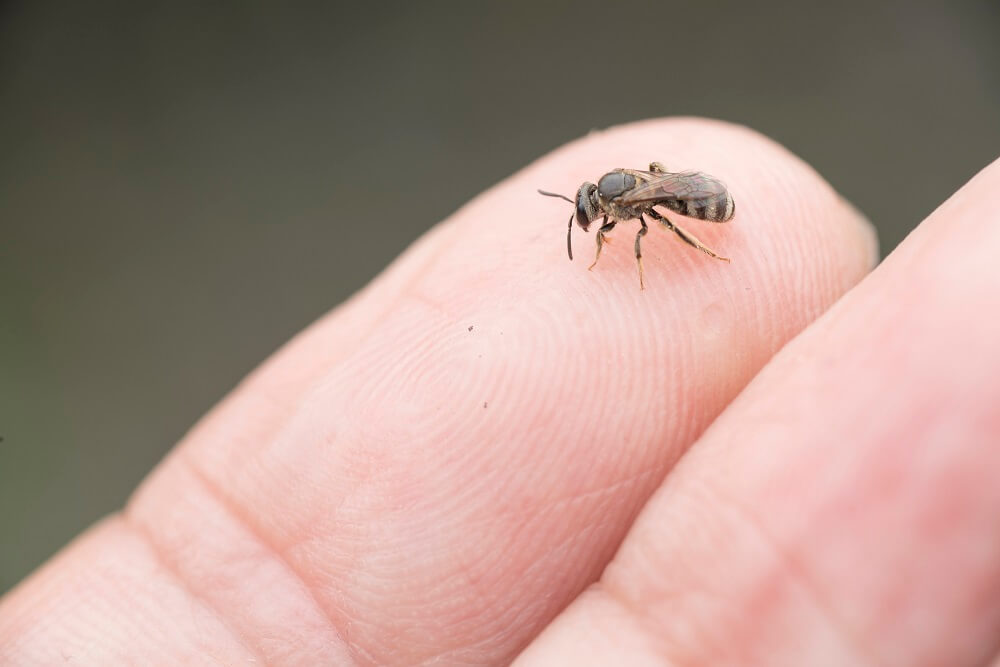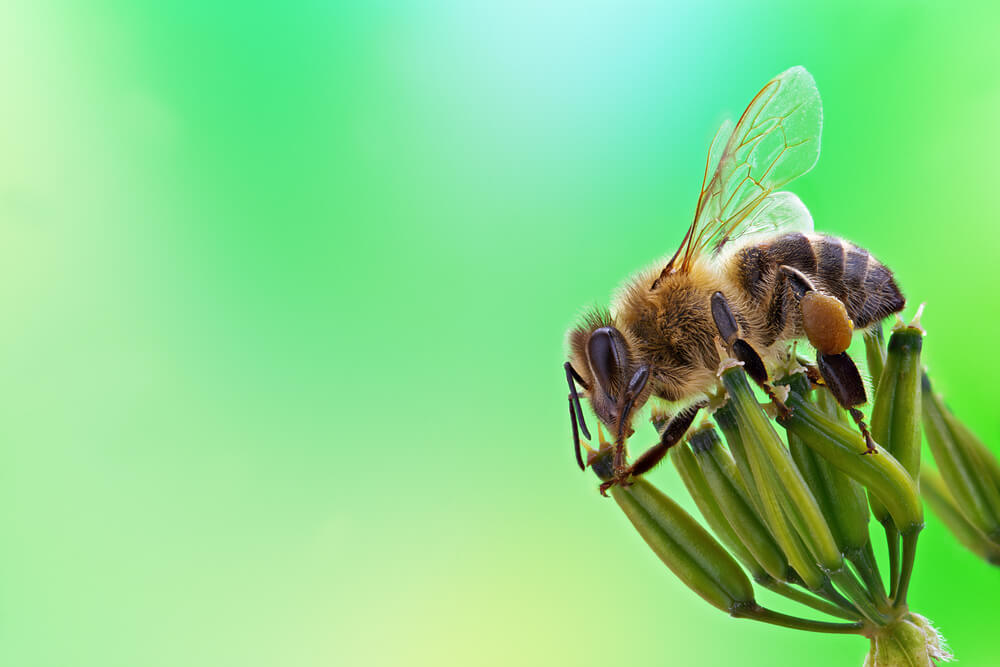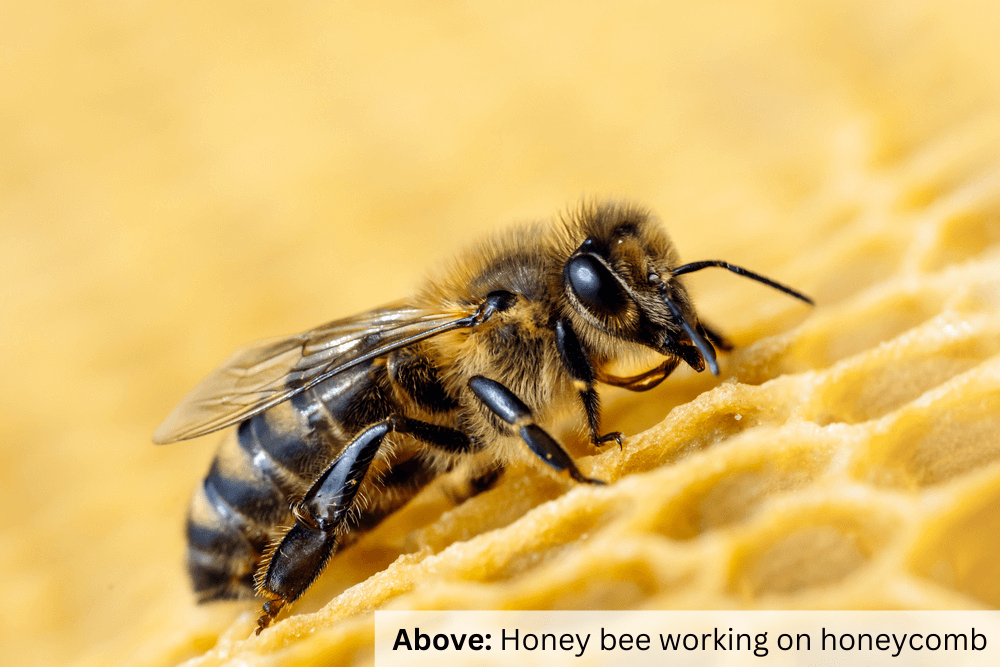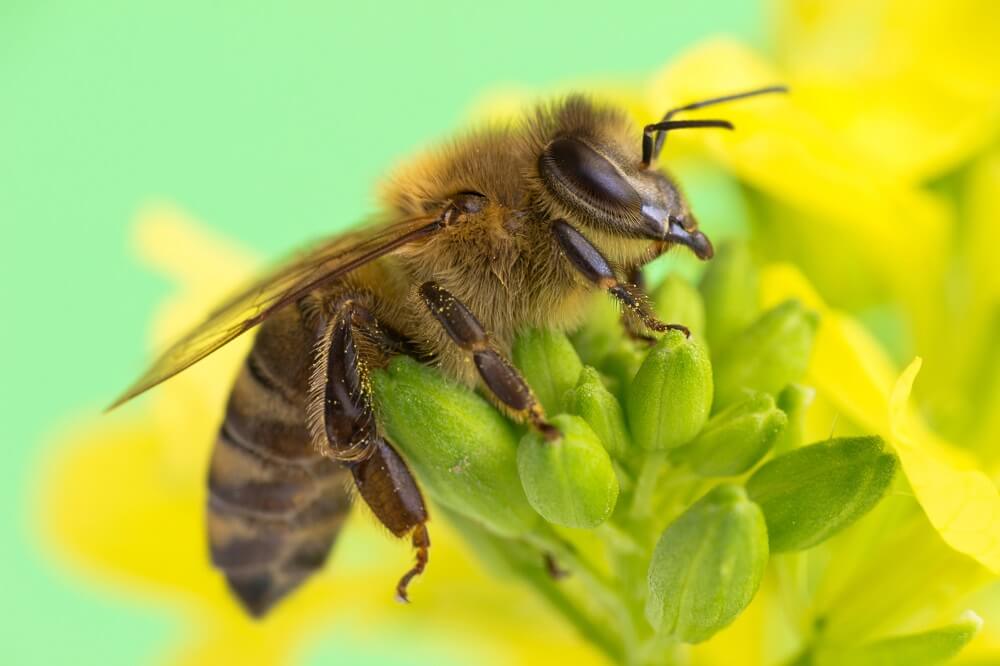Table of Contents:
Do Yellowjackets Make Honey?
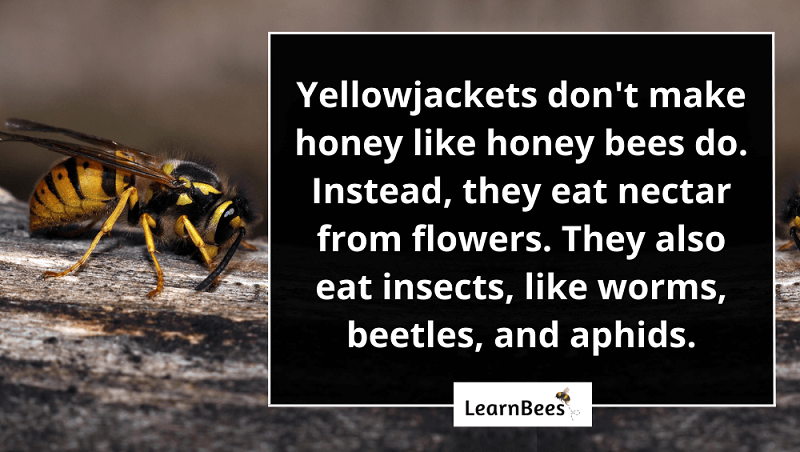
Yellowjackets don’t produce honey.
Honey is a sweet, syrup-like substance made by honey bees, honey wasps, ants, and a few other insect species.
More specifically?
Certain insects create honey by using the nectar of flowers. Plants produce nectar as a treat to entice pollinators to their blossoms.
Like honey bees, yellowjackets eat nectar to obtain carbohydrates. Nectar provides them with the energy to fly, nest, and perform other daily tasks.
But unlike honey bees:
Yellowjackets are omnivorous creatures that also eat other insects for protein.
They eat aphids, flies, worms, crickets, earwigs, and more. And while yellowjackets get a bad rap for being aggressive, their insect-eating habits earn them praise from farmers and gardeners.
Why?
Because a lot of the bugs yellowjackets eat, including cabbage worms and beetles, are common insects that attack crops. So without wasps, many of our food crops would be overrun with pests.
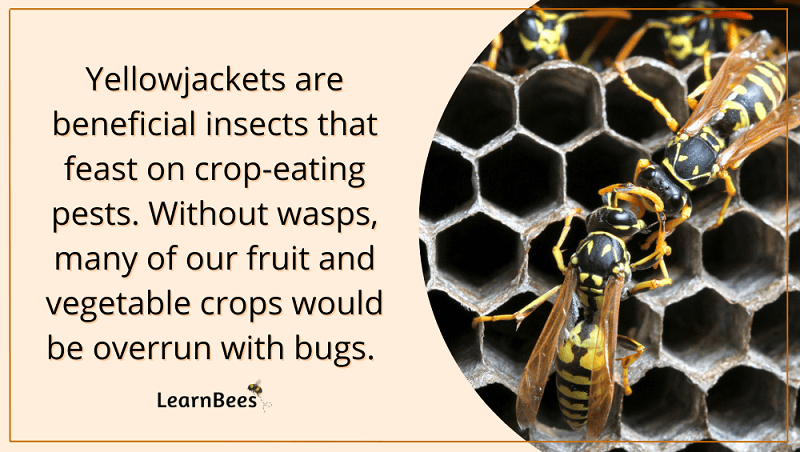
So let me be clear:
Yellowjackets are beneficial creatures, just like bees are.
They serve an invaluable role in the ecosystem by helping to keep the environment balanced. Sure, they don’t pollinate on nearly the same scale as bees do.
But their role in this world shouldn’t be diminished.
It’s worth noting that wasps and bees are closely related. In fact, many entomologists consider them to be “cousins.”
Additionally, yellowjackets are sometimes mistaken for honey bees because they have similar coloring and live in colonies that act as family units.
However, honey bees tend to be more gentle-natured.
But this is where the irony comes in.
You’d expect honey bees to be more defensive because of the sheer number of honey-loving predators they face.
Honey badgers, bears, and honey buzzards are just a few animals that target bees for their honey.
But instead?
Honey bees typically only become defensive if an animal or human starts poking around their nests. Otherwise, they prefer to stick to themselves and avoid trouble.
In contrast:
Yellowjackets are much more territorial. This is why it’s best to keep a safe distance away from yellowjackets and their nests.
Do Yellowjackets Make Honeycomb?
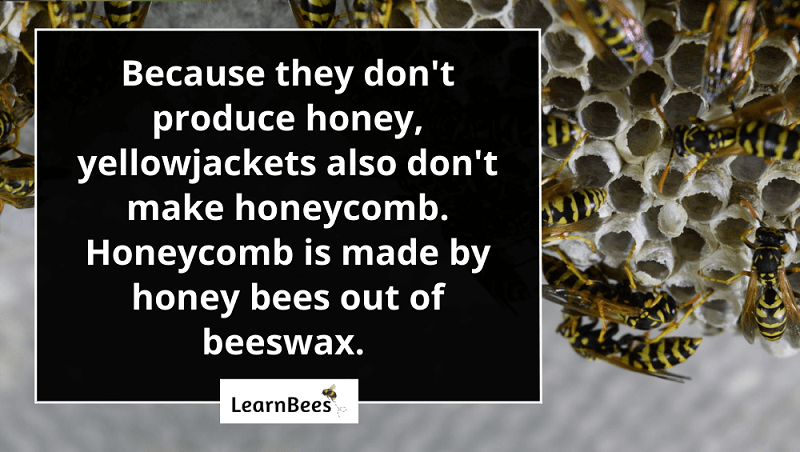
Yellowjackets don’t make honeycombs like honey bees do.
Honeycomb is made of beeswax, and it’s used for storing honey. Honey bees make beeswax by secreting it from eight wax-producing glands on their abdomen.
Honey bees also make comb to raise baby bees in. This is known as “brood comb.”
Yellowjackets don’t have wax glands, so they cannot produce beeswax.
That said:
Yellowjackets construct nests made of dozens – or even hundreds – of hexagonal cells.
Honeycomb is also made of hexagonal cells, so honey bee nests slightly resemble yellowjacket nests.
But yellowjacket nests are made of chewed wood fibers that the wasps collect from trees and shrubs. They shave the wood off the wooden surface, then mix it with their salvia to create a pulp. From there, they shape and form the wood pulp into hexagonal cells.
Once dried, their nest has a paper-like consistency, typically gray in color.
Do Yellowjackets Steal Honey From Honey Bees?
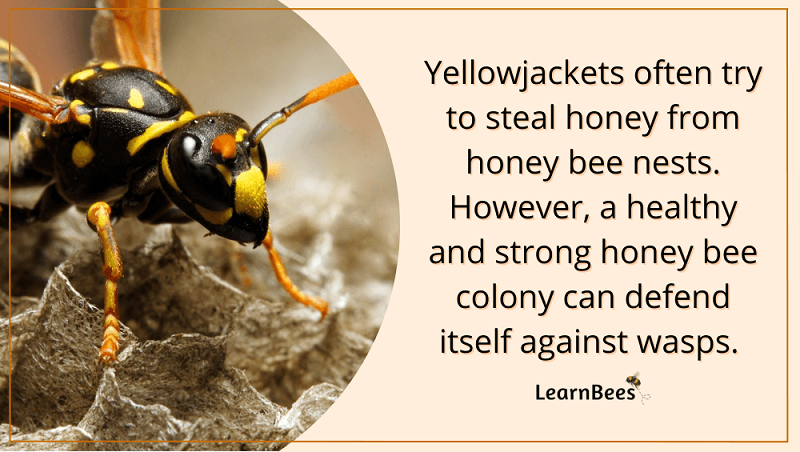
Yellowjackets and other wasps often attempt to steal honey from honey bees. Unfortunately, a strong yellowjacket colony can take down an entire honey bee nest.
Wasps target honey bee hives for two reasons:
- To steal their honey so they can eat it themselves
- To steal bee larvae to feed young yellowjackets
If only a handful of yellowjackets attack the honey bee colony, then the bees can usually handle it. The bees will either chase the wasps off or sting them to death.
Remember:
Honey bee hives can be quite large, consisting of upwards of 50,000 honey bees.
However, the danger occurs when yellowjackets attack weak or small honey bee colonies. If there are several gaps, cracks, or entrances into the hive, then the wasps have a greater chance of causing harm. Yellowjackets can easily overpower weak or small beehives.
This is why beekeepers have to be vigilant.
Once the door is open, the yellowjackets can kill the entire bee colony in a matter of hours.
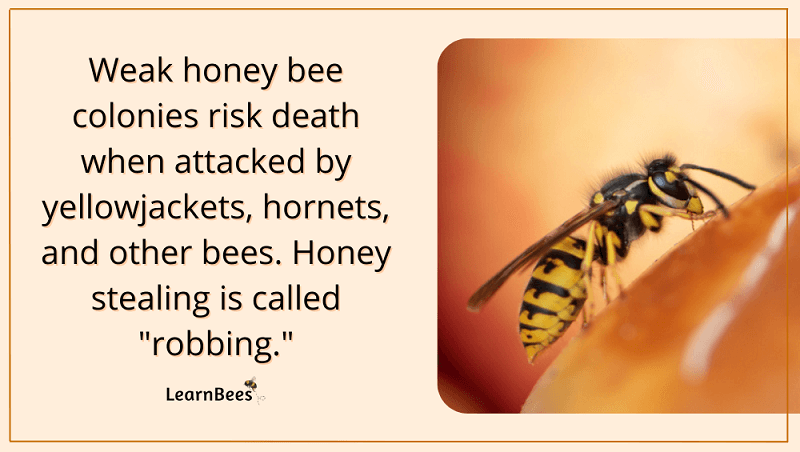
They’ll eat the bee larvae, eggs, pupae, honey – whatever they can get their hands on. They’re persistent and won’t stop until the hive is empty.
How do beekeepers prevent this?
Well, it’s important to remember that nothing is foolproof.
That said, there are things beekeepers do to stop yellowjacket attacks. For one, beekeepers can reduce the hive’s entrance so that the honey bees can easily defend it.
When the hive entrance is too big, or there are too many of them, then the honey bees can struggle to guard all areas.
Secondly, beekeepers can maintain a tidy apiary that doesn’t attract yellowjackets and other wasps. Wasps are drawn to sugary, sweet substances. So leaving honey or sugar water out can entice the yellowjackets to places you don’t want them.
Needless to say:
The relationship between yellowjackets and honey bees is interesting.
Sometimes, you’ll see them foraging next to each other on flowers. Other times, yellowjackets attack honey bee nests to steal honey and larvae.
It’s a puzzling world we live in, to say the least.
FAQs on “Do Yellowjackets Make Honey?”
- Do yellowjackets make honey in the ground?
- Do yellowjackets eat honey?
- Do yellowjackets eat honeycombs?
- Why don’t yellowjackets make honeycomb?
- Why don’t yellowjackets make honey?
- Why do yellowjackets steal honey from bees?
Do yellowjackets make honey in the ground?
No, yellowjackets don’t make honey in the ground. However, they nest in the ground in social colonies with hundreds or thousands of other yellowjackets.
Honey is made from the nectar of flowers. Honey bees collect the nectar using their long tongues, mix it with special enzymes in their salvia, then store it inside honeycombs for later. Honey is the food source honey bees rely on during the winter when flowers are unavailable.
Unlike honey bees, most of the yellowjacket colony dies before winter arrives. This leaves only the queen yellowjacket behind. She mates with male yellowjackets in the late summer and fall, so she can store enough fertilized eggs until it’s time to nest.
From there, the queen yellowjacket hibernates until spring arrives, when she will reproduce and start her own colony.
As a result, yellowjackets don’t need to create honey because they don’t remain active during the cold months like honey bees. Honey bees huddle together inside their hive during the winter. They keep each other warm by vibrating their wings and staying close.
For food, honey bees rely on the honey they make during the spring, summer, and fall.
Contrastly, yellowjacket queens hibernate in protected locations, such as hollow logs or tree stumps. Sometimes they’ll use manmade structures to hibernate in, like inside the cracks of houses or sheds.
When a yellowjacket queen is hibernating, her metabolism slows down, and she’s neither working nor eating. Her decreased metabolism allows her to survive the winter without burning much fuel. This is how she survives until spring without eating.
—> Go back to the FAQs on “Do Yellowjackets Make Honey?”
More to Explore:
- Do Wasps Make Honey?
- What’s the Difference Between Wasps, Hornets, and Bees?
- Wasp Nest vs. Bee Nest: Which One Is It?
Do yellowjackets eat honey?
Yes, yellowjackets do eat honey. Unfortunately, yellowjackets are notorious for robbing honey bee hives of their precious honey.
Yellowjackets are attracted to sugary smells, which makes them drawn to bee hives. They’ll fly around the hive trying to pick up any sweet smell they can find, then enter the nest and rip it apart in search of honey.
This is especially common in times of nectar dearth, which is when there is a lack of nectar from flowers in the environment.
The most obvious nectar dearth happens in winter when many plants go dormant. But, many places also experience a summer nectar dearth due to a hot and dry period between spring and fall.
For example, summer droughts are common in places like California, Arizona, and Nevada. As a result, flowers can wilt, and plants can die if they don’t get enough water. This is why drought-tolerant plants are beneficial for dry and hot climates.
Not only can it help the bees, but it can also help yellowjackets, ladybugs, butterflies, and other vital pollinators.
It’s also important to remember the following:
Not all flowers produce nectar.
And among the flowers that make nectar, the amount they produce can be reduced by high temperatures, low rainfall, and other less-than-ideal growing circumstances.
Planting drought-tolerant, pollinator-attracting plants is the way to go. Try to find plants native to your area so the native pollinators can also benefit from them. Additionally, native plants are already adapted to your local climate, so you have to worry less about whether they’ll survive.
Finally, avoid using harsh pesticides and herbicides in your garden. They can be toxic to bees, yellowjackets, ladybugs, butterflies, and other beneficial insects.
So to answer the central question: yes, yellowjackets do eat honey. But it’s important to remember that they rely on various nectar-producing plants to survive.
Yellowjackets are more likely to steal honey from bees when nectar sources are low.
—> Go back to the FAQs on “Do Yellowjackets Make Honey?”
More to Explore:
Do yellowjackets eat honeycombs?
No, yellowjackets don’t eat honeycombs. Instead, they eat the honey inside the honeycomb.
With that in mind, it’s an easy thing to get confused. But as mentioned, honeycombs are made of beeswax, secreted from eight wax-producing glands on each honeybee’s abdomen. Honeycomb is not a food source for bees or wasps.
Comb is used to house bee larvae and honey. So yellowjackets don’t actually eat honeycomb, they just eat the honey inside it.
But, honeycomb is often destroyed during the process of honey robbing. Robbing occurs when yellowjackets break into a honey bee hive to steal honey and larvae.
Robbing can be a significant problem for beekeepers, especially during a nectar dearth. It’s essential to take steps to protect your hives from robbers like yellowjackets or other wasps. If left unchecked, the end result could be the death of the entire honey bee colony.
—> Go back to the FAQs on “Do Yellowjackets Make Honey?”
More to Explore:
- Do Yellowjackets Sting or Bite?
- Do Hornets Pollinate?
- How Do You Get Rid of a Yellowjacket Ground Nest?
Why don’t yellowjackets make honeycomb?
Unlike honey bees, which produce wax from glands on their abdomens, yellowjacket wasps don’t make wax or any other material that could be used to create a honeycomb.
Yellowjackets may resemble honey bees slightly, but they’re two separate insects with different living, eating, and nesting habits.
The most significant similarities they share are that they live in social colonies, eat nectar and other sweet substances, and are both crucial pollinators in the ecosystem.
But, because yellowjackets don’t produce wax, they can’t make honeycomb.
—> Go back to the FAQs on “Do Yellowjackets Make Honey?”
More to Explore:
Why don’t yellowjackets make honey?
Even though yellowjackets eat honey, they don’t actually make their own.
Yellowjackets don’t survive the winter like honey bees do. As such, they don’t produce honey for food storage.
—> Go back to the FAQs on “Do Yellowjackets Make Honey?”
More to Explore:
Why do yellowjackets steal honey from bees?
Yellowjackets will steal honey from bees when nectar sources are low. In such cases, they may break into a bee hive to feed on the stored honey and larvae.
Robbing can be detrimental for beekeepers, especially during times of nectar dearth. Robbing yellowjackets and hornets can wipe out an entire honey bee hive in a matter of hours – destroying the nest, killing the bees, and stealing honey and larvae.
This is why beekeepers take measures to deter yellowjackets, hornets, and other wasps.
